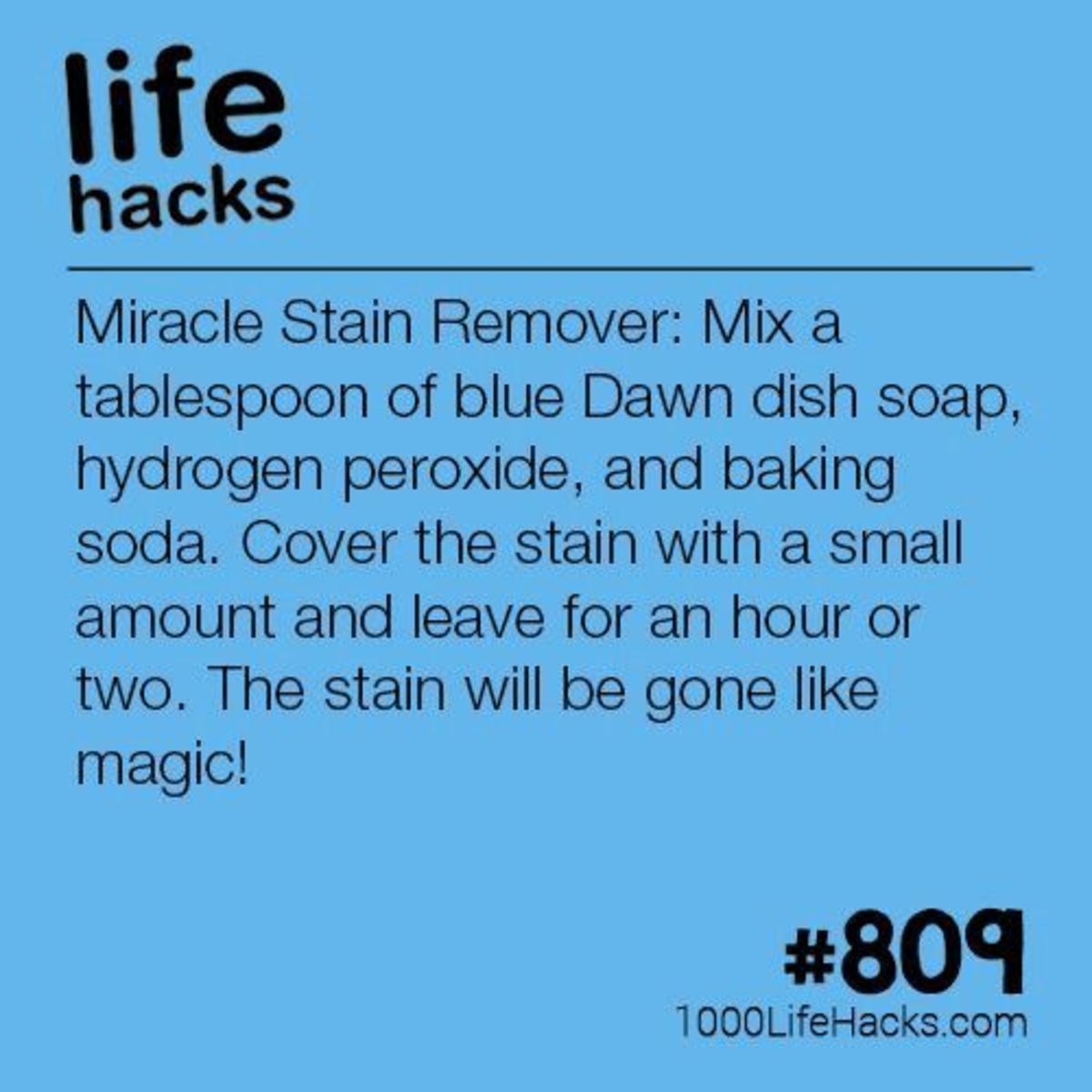Air Filters - Everything You Wanted and Need to Know (and Hopefully More!)
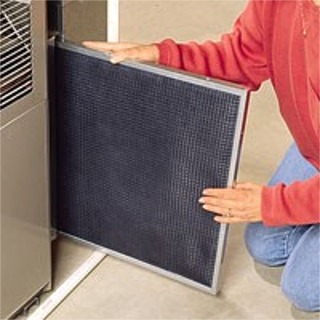
Why Do I Need An Air Filter?
Home air filters originally were designed and implemented not for cleaning the air in your home, and most are still not designed to clean and purify the air in your home. Originally developed to keep the moving parts of an A/C system clean, nowadays, indoor air quality is an important topic. Indoor air pollution is one of the top 5 health risks, and because of this, is one of the very important things that you can do to your home, even if you rent, that you can change and improve your health. Using a properly fitting, good quality air filter, changed or cleaned regularly will improve your homes air quality and will help you be healthier, with the filter filtering out all the in-air particles and germs. Portable air cleaners are available, and can be used to clean the air in certain rooms of a home. If your not sure what kind of filter to get, or how to replace your filter, contacting your local AC repairman should be your next step, as they can help you with all your air conditioning needs. Remember, just because a filter says premium, doesn't always mean that its going to be the best on the market, it might just be the best in its category.
What Kind of Air Filters Are There?
There are 6 standard air filter types (from highest efficacy to lowest): Electronic Air Cleaners; Pleated, Permanently Charged Electrostatic Filters; Deep Pleated Filters; Flat Pleated Filters; Washable/Reusable Filters; and Fiberglass/Polyester Filters.
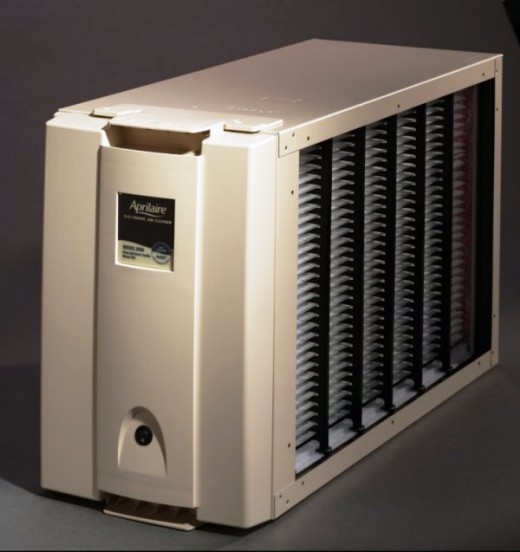
Electronic Air Cleaner:
Electronic Air Cleaners are permanent fixtures in a home’s heating and cooling system, and they require electricity to work. Although these types of air purifiers are some of the most expensive, they are very effective at removing pollution and unwanted particles in the air. Some drawbacks to having an Electronic Air Cleaner is they require regular maintenance, including disassembly and cleaning, to maintain its high level of cleaning. Also, these units can emit ozone, which study’s show are not healthy.
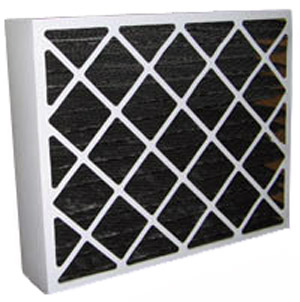
Pleated, Permanently Charged Electrostatic:
Pleated, Permanently Charged Electrostatic filters are typically 1’’ thick, and need to be changed roughly every 2-3 months, and offer some of the best air filtering for non-electric filters. They are designed to physically capture particles with its electrostatically charged fibers, which pull positive and negative ions from the air, which stick to the positive and negative charges in the filter. These filters are a more cost effective way of cleaning air than installing an electronic air cleaner. Many models offer charcoal and carbon air cleaning as well.
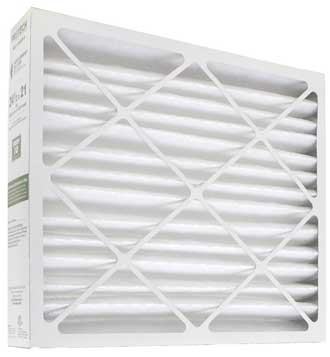
Deep Pleated:
Deep pleated filters, unlike the rest of the filters, are roughly 5-6” deep, and can only be used in systems that are specially adapted to use these kinds of filters. Typically, these filters have a reusable frame, and the filter media gets replaced 1-2 times a year. Filters in this category have a very broad range of effectiveness, with base models being slightly better than fiberglass/polyester models, all the way up to some that perform as good as pleated, permanently charged electrostatic filters. Using product reviews is a good way to determine the best deep pleated air filter for the money.
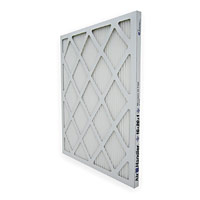
Flat Pleated:
Flat Pleated filters are 1” thick, and usually get changed every 2-3 months. These filters, made out of cotton or a polyester media, are denser than fiberglass, and capture smaller particles compared to washable/reusable or fiberglass models. These filters usually include a small pleating pattern to filter more air, while not sacrificing air movement.
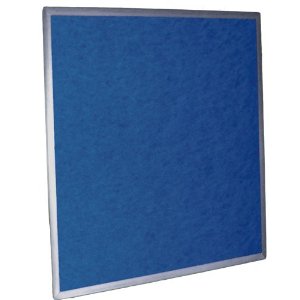
Washable/Reusable:
Washable/Reusable filters are 1” and are designed to be washed and reused. While this can cut down on expenses when it comes to buying expensive filters on a regular basis, these filters are not as good at filtering the air in your home as disposable filters are. These filters are usually not effective at filtering out smaller particles. Some advantages of buying a reusable or washable filter is the fact that you won’t have to buy a filter for quite a long time, and it’s not uncommon to get a few years use out of a reusable filter. Most manufacturers recommend that reusable filters be cleaned monthly for best performance. Although some brands claim to have an electrostatic charge, most models don’t have enough of a charge to really capture particles.
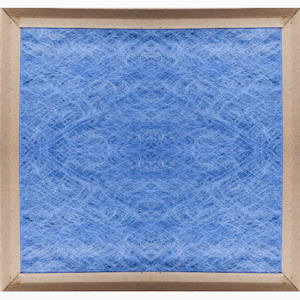
Fiberglass/Polyester:
Fiberglass or Polyester filters are the most common disposable filters on the market. At 1” thick, they are recommended to be changed monthly. These filters generally do not offer any air filtration property’s, they are just designed to protect the air conditioning and heating systems. They are designed to capture large particles that might interfere with some of the working parts of an A/C system.
How is the Performance of an Air Cleaner Measured?
Air cleaner performance is measured by how well the device cleans the air. There are 3 different things that they test when checking the performance of air filters: In-duct Particle Removal, In-duct Gaseous Pollutant Removal, and In-duct Pollutant Destruction.
In-duct Particle Removal
Most mechanical filters are good at capturing large airborne contaminants and particles, but due to them settling quickly, filters are not very effective at removing them completely from the air. Dusting, vacuuming, and even walking stirs up these particles, but most will settle before they even reach the air filter. The efficiency that an air filter removes particles from the air is one of the ways that air filter performance is measured. This efficiency is measured in units called MERV’s or minimum efficiency reporting value. The higher the MERV rating is, the better the filter will perform.
Most flat or panel air filters come with a MERV rating of about 1-4, and are commonly used in residential applications. These filters are used primarily to protect the A/C system, and offer little to no air cleaning capability’s for smaller particles, and offer fairly decent cleaning of larger particles. Particles such as mold, allergens, bacteria, dust mites, and other small things pass through these filters easily, and are barely captured. Filters with higher MERV ratings, such as those with ratings from 7-13 are considered to be almost as effective as a true HEPA filter.
Pleated filters are generally considered medium efficacy, and generally have a MERV of 5-13. They are effective at removing large particles, and are generally considered reasonably effective at removing the smaller particles. These filters, with their higher MERV rating, are considered to be almost as effective as HEPA filters, and are good at controlling indoor air pollution. Cheaper than true HEPA filters, and offering almost the same quality of filtration, these filters allow for quieter HVAC noise, as well as higher airflow.
High Efficacy filters with a MERV of 14-16, although similar in appearance to HEPA filters, are not true HEPA filters. For a filter to be considered a true HEPA filter, its MERV has to be 17-20. HEPA filters are not generally installed in residential systems, as HEPA filters usually require the system to be professionally modified by a qualified AC Repair person. HEPA systems, most commonly found in hospitals, are specially designed to handle the filter, as they have special ductwork and air handler units to combat the increased air flow resistance.
In-duct Gaseous Pollutant Removal
Although highly uncommon in residential systems, In-duct Gaseous Pollutant Removal is gaining popularity. Currently, there is no standard measurement for this, although ASHRAE is developing a method to be used for choosing which type of unit should be used in residential properties. Still under scrutiny, these units have a short filter life, and concerns about when the filter is full, it releases trapped pollutants back into the air are present. Most properly designed and built in gas-phase filter systems don’t fit in typical home HVAC systems.
In-duct Pollutant Destruction
In-duct Pollutant destruction is accomplished by UVGI, or UltraViolet Germicidal Irradiation, which uses ultraviolet light to sterilize the air. Although UVGI cleaners may not reduce allergy or asthma symptoms, these units are generally considered effective. Some of the drawbacks to using a UVGI system in a residential system are that he UVGI system can’t provide adequate UV exposure to kill some viruses, molds, and bacteria. Also, dead mold can still cause allergy symptoms to react. There are no standard measurements for UVGI systems, nor is there for PCO systems, or Photocataltyic Oxidation systems. PCO systems use in residential homes is very limited, mainly because the currently available catalysts that are used are ineffective in getting rid of gaseous pollution from the air. PCO cleaners are also known to fail to get rid of pollutants completely, and instead, create new pollution that can cause eye, throat, and nose irritation.

How Often Should I Change My Air Filter?
Air filters should be checked every month, and replaced or cleaned when dirty, to help the filter maintain optimum efficiency. Conditions inside your home, such as pets, construction, smoking, and running the fan constantly can all play a part in how often you need to change or clean your air filter. Dirty air filters choke the A/C system, and add extra stresses on the motors of you’re A/C unit. Although some people believe that it is good to have some dirt on your filter, so that it will filter the smaller particles (and this is proven to work), the filter should be changed regularly so that the system isn’t over worked.
Some Helpful Links
- Ways to Stay Cool this Summer.
This is a posting on some of the ways to help reduce your carbon footprint, as well as reduce your cooling and electrical bill. With 15, simple, you can do it at home, tips, you should be able to reduce your cooling bill by 20%, possibly more. - Tips to Reduce Your Heating Bill
This is a posting on some of the ways to help reduce your carbon footprint, as well as reduce your heating and electrical bill. With 10, simple, you can do it at home, tips, you should be able to reduce your heating bill by 20%, possibly more. - How Does an AC System Work?
We all know what a A/C system is, where its located, and what it does. But do you know how it works? How it cools the air, then distributes it throughout your home or office? - Common AC Problems and Solutions to Fix Them
Having A/C problems alone are a total bummer, but having them during summer can be almost catastrophic. Prevent your system from going out, and preform a check up and some basic maintenance today to prevent your A/C unit from dying tomorrow. - US Environmental Protection Agency - Clean Air Information
Link to the US EPA's site in regards to clean air. - Air Conditioning (AC) Repair
A Superior is a full service air conditioning and heating repair company. Servicing Destin, Fort Walton, Freeport, Crestview, Santa Rosa Beach and Niceville.



